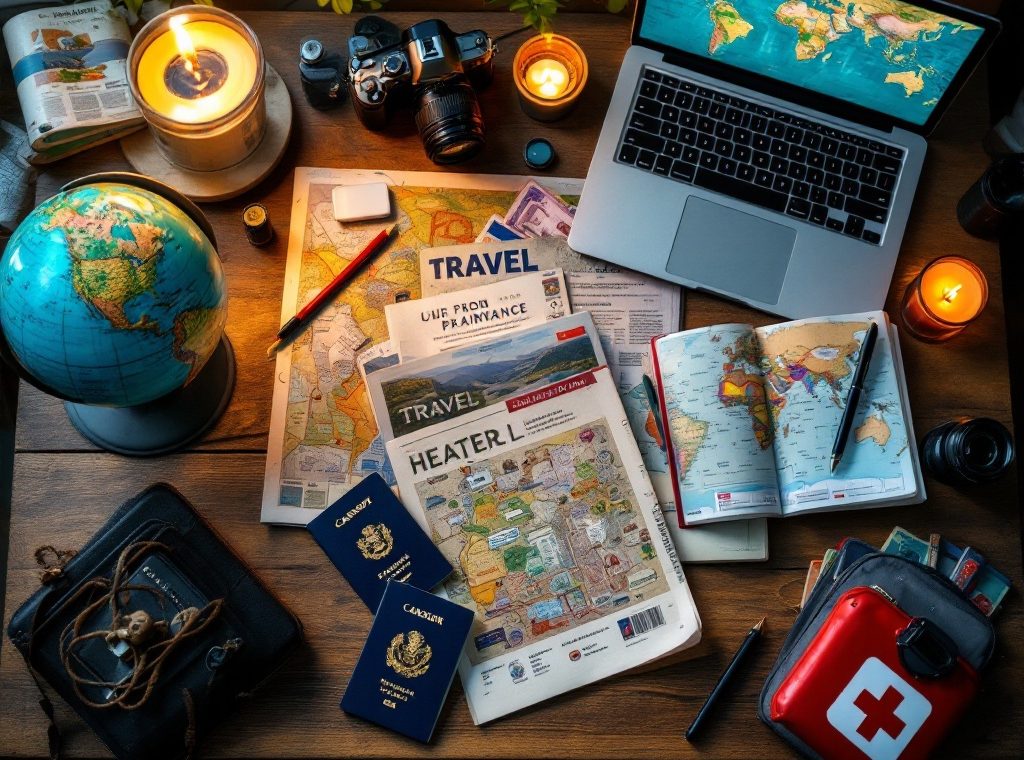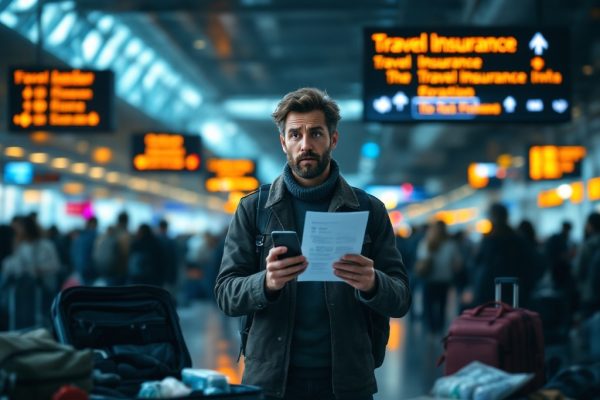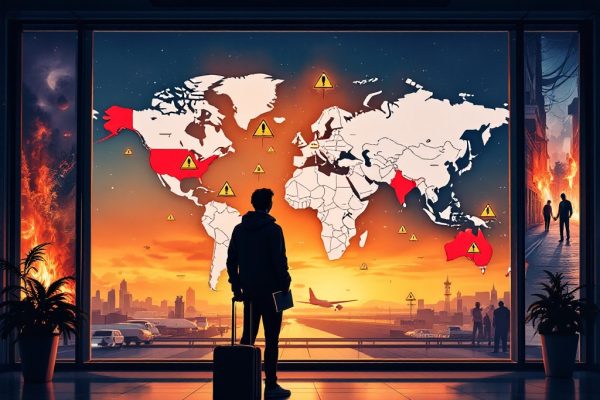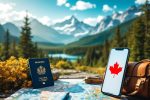Preparations to Travel Abroad: All You Need to Know
Dreaming of exploring the world? International travel can be thrilling, but careful planning is key. This guide provides essential steps to ensure a smooth and safe journey. From passport and visa requirements to health precautions and financial planning, we cover everything you need to know. Learn how to protect your documents, navigate foreign currency, stay connected, and prepare for emergencies. Start your adventure with confidence – read on to prepare for your trip abroad!
Important information
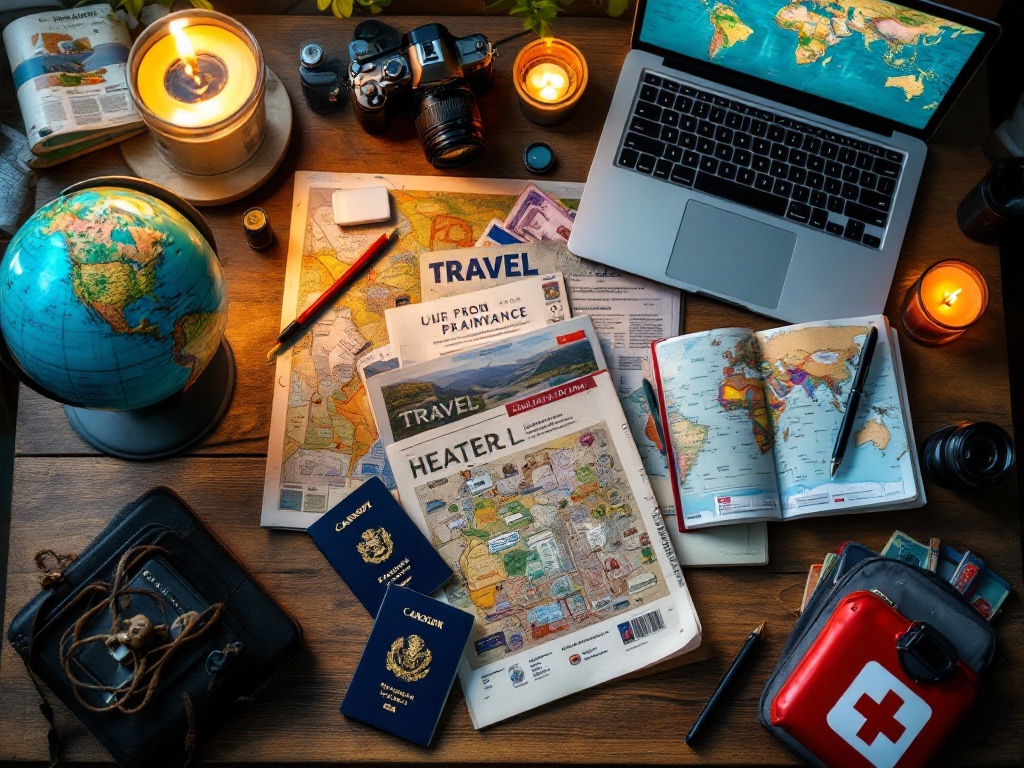
- Passport and Visa: Ensure your passport is valid for at least six months after your return date. Check visa requirements for your destination and obtain necessary documents.
- Travel Insurance: Get comprehensive travel insurance covering medical emergencies, trip cancellations, and lost baggage. Consider medical evacuation coverage for serious health issues.
- Safety and Health: Consult your government’s travel advisories for safety and health risks. Research local laws, customs, and recommended vaccinations. Pack a first-aid kit and necessary medications.
- Finances: Inform your bank and credit card company about your travel plans. Understand currency exchange options and fees. Prepare a detailed travel budget.
- Connectivity and Electronics: Pack necessary power adapters and converters. Consider a VPN for secure internet access and to bypass geo-restrictions. Download offline maps and translation apps.
Essential Preparations for Traveling Abroad
Planning a trip abroad? Start with these essential steps:
Check your passport’s validity. Ensure it extends at least six months beyond your return date.
Investigate visa requirements. Secure the necessary documents for your destination.
Protect yourself with travel insurance. This safeguards you against unforeseen issues.
Photocopy important documents. Make copies of your passport, visa, itinerary, and emergency contacts. Store these copies separately from the originals for added security.
Ensure Passport Validity
For international travel, your passport must be valid for six months beyond your return date. Begin verifying its expiration date as soon as you start planning your trip. This is crucial because without a valid passport, you won’t be able to travel.
Understand Visa Requirements
Planning an international trip? Contact the destination country’s embassy or consulate for specific visa requirements. Ensure your visa is valid for your travel dates and understand any associated conditions to avoid unexpected issues.
Prepare and Copy Travel Documents
Before you travel, take steps to protect your important documents. Photocopy your passport, driver’s license, visas, and itinerary. Store these copies separately from the originals in case of loss or theft. For added security, save digital copies online using strong passwords.
Research and Planning for Your Destination
Traveling abroad requires thorough preparation for a smooth and enjoyable trip. Explore travel guides, websites, and online forums for insights into local customs, attractions, and safety guidelines. Government travel advisories provide crucial security updates, while traveler reviews offer valuable firsthand perspectives. Learning basic local phrases can also enrich your experience.
Safety
Consult your government’s travel advisories for current information and recommendations. Research local laws and customs to ensure a respectful and incident-free trip. Identify safe neighborhoods and research transportation options. Be aware of common scams to minimize potential risks.
Health
Consult your doctor or a travel clinic about recommended vaccinations and preventative medications. Research potential health risks at your destination and pack appropriate medical supplies. Familiarize yourself with the local healthcare system and locate nearby medical facilities. Travel insurance is highly recommended for coverage of medical emergencies and evacuations.
Step 1: Research and Plan
Explore travel guides, websites, and online forums. Gain insights into local customs, attractions, and safety guidelines. Check government travel advisories for security updates and read traveler reviews.
Step 2: Prioritize Safety
Consult your government’s travel advisories. Research local laws and customs. Identify safe neighborhoods and research transportation options. Be aware of common scams.
Step 3: Ensure Your Health
Consult your doctor or a travel clinic about recommended vaccinations and medications. Research potential health risks at your destination. Pack appropriate medical supplies and familiarize yourself with the local healthcare system. Consider travel insurance for medical emergencies and evacuations.
Step 4: Streamline Your Trip
Research transportation options like public transport, taxis, or car rentals. Compare prices and convenience. Book accommodations that suit your budget and preferences. Consider factors like location, amenities, and reviews. Pre-booking, especially during peak season, can save you both time and money.
Learn Safety and Security Information
Before traveling, research your destination’s safety. Check government travel advisories for potential health and security risks. This crucial information will contribute to a safer trip.
Investigate Health Precautions and Vaccinations
About a month before your trip, consult your doctor about recommended or required vaccinations for your destination. These might include hepatitis A and B, typhoid, and routine immunizations like measles and flu.
Pack a basic first-aid kit as a sensible precaution.
Familiarize yourself with local healthcare options and secure comprehensive travel insurance that covers medical emergencies.
Research any health advisories for your destination and ensure you have all necessary medications, including prescriptions.
Explore Transportation and Accommodation Options
Research transportation options like trains, buses, ride-sharing, and rentals to plan your trip effectively. Consider cost, convenience, and safety when making your choice.
Explore accommodations. Hotels, hostels, vacation rentals, and guesthouses offer various price points and experiences. Booking in advance is recommended, particularly during popular travel times.
Account for travel time between your destinations and lodging.
Financial Preparations and Money Matters
Before your trip, inform your bank and credit card company about your travel dates and destination to avoid any potential problems.
Use various payment methods like local currency, credit cards, and travel money cards.
Check currency exchange rates and transaction fees beforehand to optimize your spending.
Prepare a detailed travel budget covering accommodation, transportation, meals, entertainment, and a contingency fund for unforeseen events.
Notify Bank and Credit Card Companies
Before embarking on your journey, inform your bank and credit card companies of your travel plans. This proactive step prevents them from mistakenly flagging your transactions as fraudulent and blocking your cards. By notifying them, you ensure uninterrupted access to your funds for expenses like hotels and meals, avoiding the inconvenience of dealing with blocked cards while abroad. This will allow you to use your cards without any issues.
Understand Currency Exchange and Payment Methods
Planning your finances for your trip? Here’s a helpful guide:
Payment Methods
- Cash is often preferred.
- Credit cards (Visa, Mastercard, American Express) are widely accepted.
- Debit cards are also commonly used.
- Mobile payment options are gaining traction in some areas.
- Traveler’s checks are becoming less common.
Currency Exchange
Consider these options for exchanging currency:
- Banks often offer competitive exchange rates.
- Exchange bureaus can be a convenient option.
- Airports and hotels also offer exchange services, but be mindful of potential fees.
Comparing exchange rates before your trip is highly recommended to maximize your budget.
Consider Travel Credit Cards and Discounts
Travel credit cards offer excellent perks, such as waiving foreign transaction fees and earning valuable rewards. Some cards even provide travel insurance, a particularly helpful feature for international trips. Certain cards also offer discounts on flights, hotels, and car rentals. Because card benefits vary, compare offers from different companies to find the best travel perks for your specific needs.
Health and Travel Insurance Considerations
Travel safely and smartly with these essential tips:
Protecting Your Trip
Secure travel insurance to cover unexpected medical costs, trip cancellations, and lost baggage. For serious medical issues, consider emergency medical evacuation insurance for transport to better-equipped facilities.
Health Preparations
Consult your doctor or a travel clinic 4-6 weeks before your trip to discuss vaccinations and necessary medications. Check for health advisories at your destination. Pack all prescription medications with copies of your prescriptions and a doctor’s note, if required. Carry a basic first-aid kit with essential medications and supplies.
Purchase Travel Insurance
Protect your journey with travel insurance. It covers unforeseen medical emergencies abroad, trip cancellations, and lost luggage. A comprehensive plan offers peace of mind, so ensure you’re covered before your departure.
Plan for Emergency Medical Evacuation
Planning for a medical emergency abroad starts with a solid evacuation strategy. Evaluate potential costs, the extent of your coverage, and available transport options. Carefully review your insurance policy, noting pre-approval requirements and the claims process. Maintain a readily accessible list of essential contacts. Before traveling, research air ambulance services at your destination and consider other emergency transport possibilities. Advance planning provides invaluable peace of mind during your trip. Here’s a step-by-step guide to help you prepare:
Evaluate Evacuation Costs and Coverage. Assess potential medical evacuation costs and the extent of your insurance coverage for these expenses.
Review Insurance Policy. Thoroughly review your insurance policy, paying close attention to pre-approval requirements and the claims process for medical evacuations.
Prepare Contact List. Create and maintain an easily accessible list of essential contacts, including your insurance provider, family members, and local emergency services at your destination.
Research Air Ambulance Services. Before your trip, research available air ambulance services at your destination and familiarize yourself with their contact information and procedures.
Explore Alternative Transport. Consider alternative emergency transport options, such as commercial medical escorts or ground ambulances, depending on your location and medical needs.
Pack Prescription Medications and Travel Medicine
Remember to pack any prescribed medications, over-the-counter remedies (like motion sickness medication or pain relievers), and a first-aid kit.
Safety and Crisis Planning for International Trips
Enroll in the Smart Traveler Enrollment Program (STEP) to enhance your travel safety. This program notifies the nearest US embassy or consulate of your trip, providing vital assistance during emergencies abroad. Prepare a list of emergency contacts, including family, friends, and your physician. Also, add local emergency numbers for your destination. Research secure accommodations and reliable transportation in safe neighborhoods.
Enroll in STEP. Registering with STEP informs the closest US embassy or consulate of your travel plans, enabling them to offer support during crises.
Compile emergency contacts. Create a list that includes family, friends, and your physician, ensuring you have readily available support networks.
Gather local emergency numbers. Find and save local emergency numbers for police, fire, and medical services at your destination, enabling swift action if needed.
Research safe accommodations and transport. Prioritize safety by researching secure accommodations and reliable transportation options in safe neighborhoods, mitigating potential risks.
Register with STEP and Locate US Embassy
Planning a trip or relocating abroad? Enroll in the Smart Traveler Enrollment Program (STEP), a free service provided by the US government. STEP allows US citizens and nationals to register their travel plans with the nearest US Embassy or Consulate, ensuring they receive crucial safety updates about their destination, including alerts during emergencies. This enrollment also enables the Embassy to contact you during a crisis, such as a natural disaster, civil unrest, or even a family emergency. Knowing the location and contact information of the nearest US Embassy or Consulate, readily available on the US Department of State’s website, is essential for assistance with lost passports, legal matters, or medical emergencies.
Plan for Emergencies and Prepare Emergency Contacts
Compile a list of emergency contacts, including family, friends, and your country’s embassy or consulate.
If you get separated from your group while traveling, a communication plan is vital. Establish a designated meeting point as a safe fallback location.
Make sure everyone in your group knows where to go.
Familiarize yourself with local emergency numbers. Don’t rely solely on 911, which may not work internationally.
Research potential risks at your destination, such as natural disasters or political instability.
Prepare for unexpected events like flight cancellations or lost luggage.
Consider Lodging and Road Safety Abroad
Before embarking on your road trip, thoroughly research your destination’s road safety record and familiarize yourself with local driving customs. Understanding road conditions and traffic regulations specific to the area will contribute significantly to a safer journey.
When booking accommodations, prioritize safety and choose well-reviewed options. Look for establishments conveniently located near your planned activities. Opting for reputable hotels or verified rental properties provides peace of mind and ensures a worry-free vacation experience.
Packing and Connectivity Tips for Overseas Journeys
Planning a trip abroad? Smart packing is essential. Create a packing list and select versatile clothing items for various outfit combinations. Pack light layers to adapt to changing weather conditions. Include travel-sized toiletries and essential electronics like chargers. Don’t forget crucial items such as your passport and any necessary medications. Comfortable walking shoes are vital for exploring. Check the weather forecast and leave room in your luggage for souvenirs.
Power Essentials for International Travel
Ensure you have the correct power adaptors and converters. Research your destination’s voltage and plug type to determine your needs. A universal travel adaptor offers compatibility with various plug types.
A portable power bank is essential for charging your devices on the go.
Staying Connected Abroad
Explore local SIM card options or consider international roaming. Download offline maps and translation apps before you leave. For secure internet access and bypassing geo-restrictions, use a VPN. A VPN can also provide access to content from your home country.
Pack Appropriately for Your Destination
Consider the local climate and cultural norms when choosing clothes.
Pack comfortable footwear, especially if you plan on doing a lot of walking.
Remember toiletries and any necessary medications.
Don’t forget electronics and chargers.
Pack a first-aid kit for minor emergencies.
Crucially, pack your travel documents and any required power adapters.
A reusable water bottle and some snacks can be very helpful, especially on longer journeys.
A smaller, lightweight bag is ideal for day excursions.
Bring Adaptors, Converters, and Power Solutions
Traveling internationally? Don’t forget your power adapters and converters! These small but essential devices ensure your electronics function correctly abroad, as different countries use varying voltages and plug types. Without the correct adapter or converter, you risk damaging your valuable gadgets.
Before Your Trip
- Research your destination’s plug type and voltage.
- Consider a universal adapter for broad compatibility.
Protecting Your Electronics
- Some electronics require a voltage converter to safeguard against voltage fluctuations.
- Check your device’s specifications for voltage requirements.
Pack wisely and stay powered up!
Plan for Connectivity and Use of VPNs
VPNs encrypt your internet traffic, shielding your data from prying eyes, especially on public Wi-Fi. They also mask your IP address, granting access to geo-restricted content.
Choosing a reliable VPN is crucial. Research VPN providers before traveling, considering data limits and server locations, as coverage varies by country.
Download and test the VPN app at home. Ensure its compatibility with your device’s operating system to prevent later issues.

